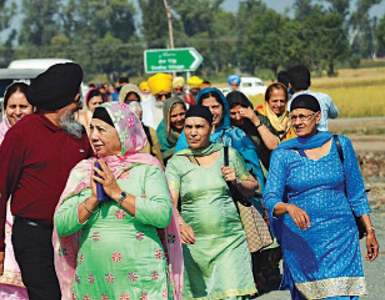AT a time of great confrontation and mistrust in the subcontinent, Pakistan has taken a major step towards peace by opening the Kartarpur Corridor in Punjab’s Narowal district.
The corridor gives visa-free access to devotees from across the border to visit Gurdwara Darbar Sahib, one of Sikhism’s holiest shrines, on this side of the fence. The corridor was formally opened by Prime Minister Imran Khan on Saturday in a ceremony attended by hundreds of people, including former Indian premier Manmohan Singh, as Sikh yatrees hailed the decision.
In his speech at the event, Mr Khan called for peace and cross-border trade between Pakistan and India, while also highlighting the grim situation in India-held Kashmir. Through the corridor, 5,000 visitors will be able to cross over from India daily to visit the shrine in Pakistan without a visa.
Indeed, religious tourism has great potential to promote people-to-people contacts in the subcontinent. Pakistan is home to other significant Sikh shrines — in Hasan Abdal, Lahore etc — and a similar formula can perhaps be adopted to let foreign visitors pay respects at these religious places through a more relaxed visa regime.
Similarly, there are ancient Hindu temples in Sindh’s Thar region, the Hinglaj mandir in Balochistan, as well as Katas Raj in Punjab, which can attract visitors from India and elsewhere.
With Kartarpur, Pakistan has shown its intentions to facilitate non-Muslim visitors, and a more relaxed bilateral visa formula can help promote religious tourism. However, it takes two to tango, and India must also reciprocate by easing restrictions on Pakistani visitors wanting to pay their respects at revered Sufi dargahs on the other side of the border. The chill in bilateral relations has resulted in difficulties for Pakistanis wanting to visit the dargah of the revered Khawaja of Ajmer, Nizamuddin Aulia in Delhi, as well as the tombs of other Muslim saints on the occasion of their urs or even otherwise.
Pakistan has extended a hand of friendship by facilitating Indian Sikhs in their demand to easily access Kartarpur; India must do the same and make arrangements for Pakistanis to visit Muslim sites in their country without hassle.
The promotion of religious tourism and people-to-people contacts should be pursued to reduce hostilities between Islamabad and New Delhi. However, the key irritants in the relationship — particularly the Kashmir issue — must not be lost sight of. Mr Khan rightly said at the Kartarpur event that a just solution to the Kashmir question could help bring peace to the subcontinent.
Unfortunately, India’s rulers have failed to grasp this basic fact for over seven decades. If India is serious about the pursuit of peace, a good first step would be to lift the siege of occupied Kashmir and let the beleaguered region’s people breathe. Constructive dialogue on Kashmir, together with confidence-building measures, can help break the deadlock in the subcontinent.
Published in Dawn, November 12th, 2019













































